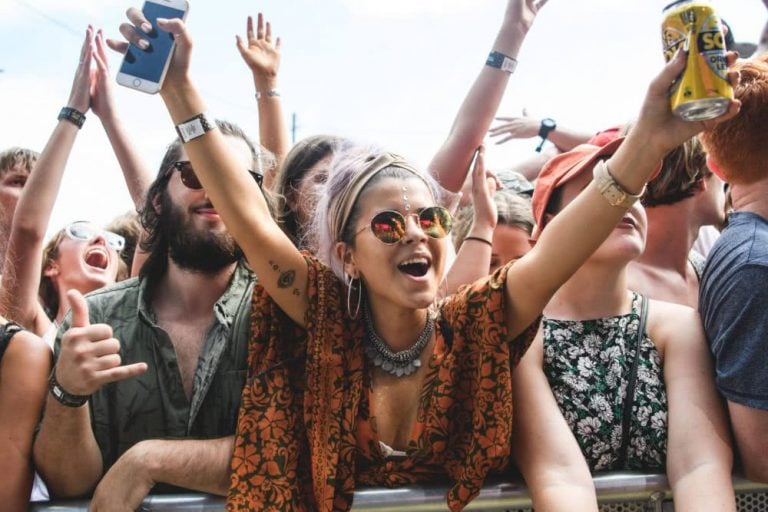Given festivals can be a noxious cocktail of loud music, intense physical activity, excessive alcohol consumption and poor sleep, perhaps it’s not surprising how frequently a weekend at one of these events can end in a mental health nightmare. We’ve all been either that person who’s lost, confused and tripping out in the middle of a moshpit, or we’ve seen them there.
After all, a good night’s sleep is one of the best ways to stave away anxiety, as are proper hydration and good, square meals. But who worries about those kinds of things when they’re enjoying a festival? It’s rare that punters get the nine good hours of shut-eye they need to stay alert and happy when they’re sleeping in a cramped, hot tent, surrounded by drunken revellers and noisy hoons – and rarer still that anyone will chow down on anything but salty, fattening snacks.
“Large outdoor music festivals are about music, fun and having a good time, but unfortunately they can and will pose many health-related risks,” Paul Gilligan, CEO of St. Patrick’s Mental Heath Services, told the website Walk In My Shoes. “Many of those [risks] result from increased use of drugs and alcohol. All psychoactive drugs have the potential to cause both short and long-term mental health problems. Festival-goers need to be aware and mindful of this fact”.
And, finally, there’s the music itself. Some controversial studies conducted by Finnish researchers have found that obsessively listening to dark and heavy music can increase one’s propensity to negatively brood over past hurts, impacting the chances of self-regulating their mood.
“This style of listening results in the feeling of expression of negative feelings, not necessarily improving the negative mood,” Dr. Suvi Saarikallio, one of the authors of the study, told Medical News Today.
But for every disturbing study concerning music’s potential for harm, there is a more optimistic one to offset it. Therapists have known for many years that listening to beloved music can have a positive effect on those suffering from depression and anxiety – there is a reason that so many practitioners use music therapy as a way of helping those who might otherwise feel hopeless.
Love Music?
Get your daily dose of metal, rock, indie, pop, and everything else in between.
“The research is suggesting that we are looking at about ten minutes to 20, 25 minutes of intentional music listening can put you right into that [positive] headspace,” music therapist Jennifer Buchanan told Fox News.
Indeed, many specialists believe the element of intent is key. To properly boost one’s mental health, it’s imperative to set aside the time to listen to music – not to do it while distracted, or otherwise occupied. And what is a music festival but a chance to listen to music and nothing else; to lose oneself in sound?
Furthermore, music can actively combat stress – as can dancing. Both trigger biochemical stress reducers which in turn help stop one from spiralling into a panic attack. A 2012 article published in Women’s Health highlighted the latter as a particularly important way of staying happy and mentally healthy.
“The ample flow of mood-improving chemicals that dancing releases means, of course, that raising the roof can elevate your mental state,” goes the article. “Just one lively dance session can slay depression more than vigorous exercise.”
The best way to maximise your experience at a music festival, researchers say, is to come prepared.
Clearly, there are two sides to this story. Festivals don’t have to be the dens of freak-outs and panic attacks they can sometimes be. The best way to maximise your experience at a music festival, researchers say, is to come prepared. Drink a lot of water; bring a lot of good, nourishing food; try, to the best of your ability, to get good sleep before, during and after a festival; and try to steer clear of most major drugs.
Of course, all of this is very easy to say, but much harder to put into practice, and some of the onus of responsibility falls onto festival organisers. Luckily, they are stepping up, frequently employing the services of such mental health advocacy groups as Chill Welfare – a not-for-profit, volunteer-led organisation that seeks to give assistance to any festival-goers who might need it.
“If you’re a man with a mental health illness, you’re much more likely to die early,” GP and Chill Welfare support worker Amy Reimoser explained to The Guardian. “You’re more likely to smoke, more likely to abuse substances. A festival is a good chance to perhaps get hold of people like that who don’t know they have a problem.”
Good mental health does not come easy. It’s not something you should ever take for granted, let alone abuse. And it’s something you can actively preserve in the high-pressure environment of the festival. Be prepared, and you’ll be able to enjoy the music in the way it was meant to be enjoyed.
Australia has a huge lineup of positive music festivals to enjoy in 2017, including the two-night Snowtunes at Jindabyne on Friday September 1 and Saturday September 2. Sign up to our newsletter for more festival updates.


































